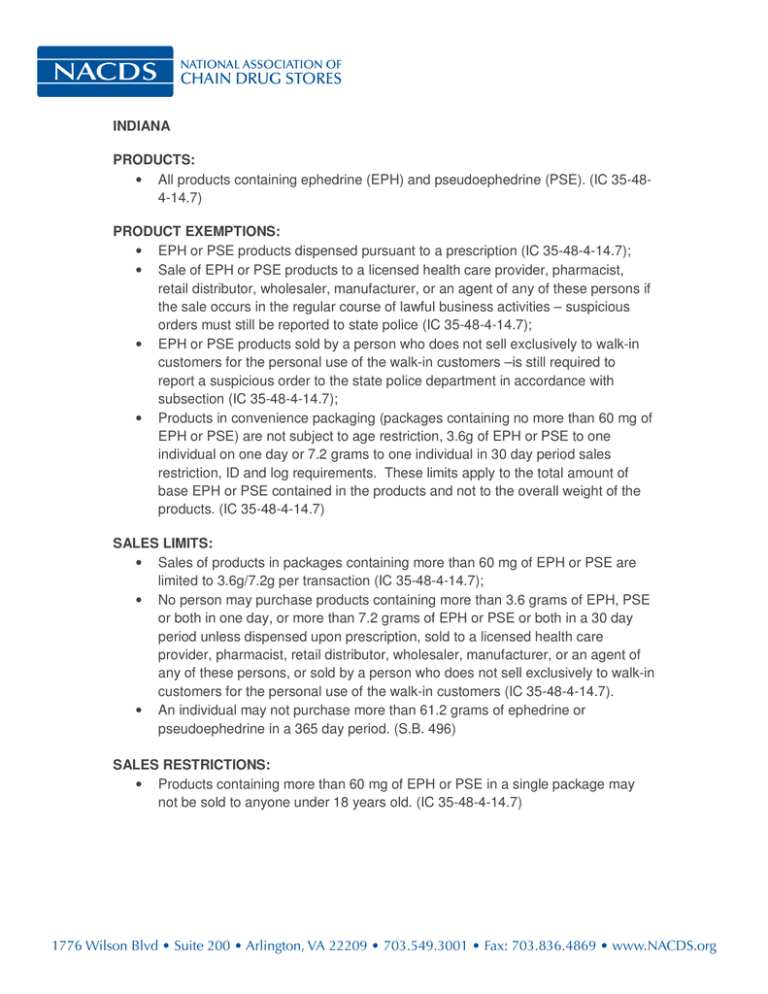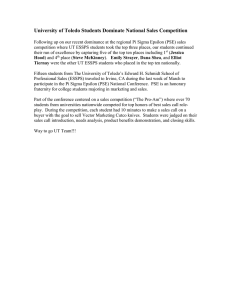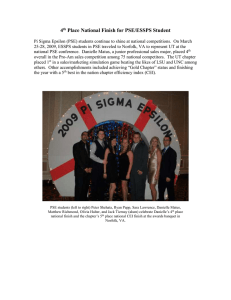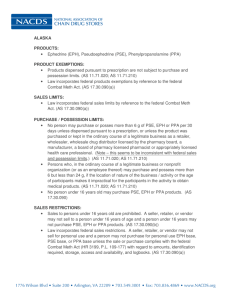PRODUCT EXEMPTIONS - National Association of Chain Drug Stores
advertisement

INDIANA PRODUCTS: • All products containing ephedrine (EPH) and pseudoephedrine (PSE). (IC 35-484-14.7) PRODUCT EXEMPTIONS: • EPH or PSE products dispensed pursuant to a prescription (IC 35-48-4-14.7); • Sale of EPH or PSE products to a licensed health care provider, pharmacist, retail distributor, wholesaler, manufacturer, or an agent of any of these persons if the sale occurs in the regular course of lawful business activities – suspicious orders must still be reported to state police (IC 35-48-4-14.7); • EPH or PSE products sold by a person who does not sell exclusively to walk-in customers for the personal use of the walk-in customers –is still required to report a suspicious order to the state police department in accordance with subsection (IC 35-48-4-14.7); • Products in convenience packaging (packages containing no more than 60 mg of EPH or PSE) are not subject to age restriction, 3.6g of EPH or PSE to one individual on one day or 7.2 grams to one individual in 30 day period sales restriction, ID and log requirements. These limits apply to the total amount of base EPH or PSE contained in the products and not to the overall weight of the products. (IC 35-48-4-14.7) SALES LIMITS: • Sales of products in packages containing more than 60 mg of EPH or PSE are limited to 3.6g/7.2g per transaction (IC 35-48-4-14.7); • No person may purchase products containing more than 3.6 grams of EPH, PSE or both in one day, or more than 7.2 grams of EPH or PSE or both in a 30 day period unless dispensed upon prescription, sold to a licensed health care provider, pharmacist, retail distributor, wholesaler, manufacturer, or an agent of any of these persons, or sold by a person who does not sell exclusively to walk-in customers for the personal use of the walk-in customers (IC 35-48-4-14.7). • An individual may not purchase more than 61.2 grams of ephedrine or pseudoephedrine in a 365 day period. (S.B. 496) SALES RESTRICTIONS: • Products containing more than 60 mg of EPH or PSE in a single package may not be sold to anyone under 18 years old. (IC 35-48-4-14.7) • EPH or PSE may be sold only by a pharmacy or a retailer that uses the NPLEx tracking system. (S.B. 496) • However, through January 1, 2014 a retailer who does not use the NPLEx tracking system and meets certain other requirements may maintain sales if they: Do not sell more than 61.2 grams of ephedrine or pseudoephedrine to an individual in a 365 day period; Prohibit a person convicted of certain offenses involving methamphetamine from possessing ephedrine, pseudoephedrine, or phenylpropanolamine within seven years of the person's conviction, unless dispensed under a prescription. ID REQUIREMENTS: • In order to purchase any product containing more than 60 mg of EPH or PSE in a single package, purchaser must produce a valid government issued photo identification showing the date of birth of the person. (IC 35-48-4-14.7) TRANSACTION RECORDS/ELECTRONIC LOG: • Purchaser must sign a written or electronic log attesting to the validity of the information. RECORDKEEPING REQUIREMENTS: • In order to purchase packages containing more than 60 mg of EPH or PSE, purchaser must complete a paper or an electronic log with the purchaser's name, address, and driver's license or other ID number. The clerk conducting the transaction must then initial or electronically record the clerk's ID on the log; the paper or electronic logs must be in a format approved by the state police department with the purchaser’s name, address, and driver’s license or other identification number (IC 35-48-4-14.7); • Records must be retained for at least 2 years and may be inspected by a law enforcement officer in accordance with state and federal law. (IC 35-48-4-14.7) • Retailer must maintain record of information for each sale of nonprescription product containing PSE or EPH. Required information includes: name, address of each purchaser, type of identification, governmental entity that issued identification, PSE or EPH product purchased, including number of grams the product contains, date, time of transaction. NATIONAL PRECURSOR LOG EXCHANGE (NPLEX): • January 1, 2012 a retailer shall provide before completing a sale of an over-thecounter product containing PSE or EPH, electronically submit the required information to National Log Exchange ( NPLEx) administered by NADDI , if • • NPLEx is available to retailers in the state w/out a charge accessing the system. Retailer may not complete the sale if the system generates a stop sale alert. If retailer selling over-the-counter product containing EPH or PSE experiences mechanical or electronic failure of the electronic sales tracking requirement, the retailer shall maintain a written log or an alternative electronic recordkeeping mechanism until the retailer is able to comply with the electronic sales tracking requirement. . (IC 35-48-4-14.7) Requirements that apply to NPLEx: information stored may only share with law enforcement officials, law enforcement may access Indiana transaction information maintained in system for investigative purposes, NADDI may not modify sales transactions that is shared with law enforcement, and at least one (1) time per week, NADDI shall forward Indiana data contained in system that couldn’t be completed due to the issuance of stop alert, to the state police dept. PRODUCT PLACEMENT: • All products containing more than 60 mg of EPH or PSE in a single package must be stored behind a counter in an area inaccessible to a customer or in a locked display case that makes the drug unavailable to a customer without the assistance of an employee. • Warning sign must be posted stating that it is a criminal offense to purchase more than 7.2 grams of EPH or PSE in a 30 day period and also an offense to purchase more 3.6 g of EPH or PSE on one day. The warning sign must list maximum amounts of EPH or PSE that may be purchased in both grams and milligrams. REPORTING SUSPICIOUS TRANSACTIONS: • A retail distributor, wholesaler, or manufacturer is required to report a suspicious order to the state police department in writing (IC 35-48-4-14.7); • Within 3 days after discovery of an unusual theft (the theft or unexplained disappearance of drugs containing 10 grams or more of EPH or PSE in a 24 hour period) at a particular retail store, the retailer shall report the unusual theft to the state police department in writing. If 3 unusual thefts occur in a 30 day period at a particular retail store, the retailer shall, for at least one 180 days after the date of the last unusual theft, locate all drugs containing EPH and PSE behind a counter in an area inaccessible to a customer or in a locked display case that makes the drug unavailable to customers without the assistance of an employee. (IC 35-484-14.7) PENALTIES: • Knowing or intentional violations of sales limits, restrictions, product placement, ID and record keeping requirements are a Class C misdemeanor. However, the offense is a Class A misdemeanor if the person has a prior conviction under the • laws governing sales limits, restrictions, product placement, ID and record keeping requirements. (IC 35-48-4-14.7) It is a criminal offense to purchase more than 7.2 grams of EPH or PSE in a 30 day period and also an offense to purchase more 3.6 g of EPH or PSE on one day. RETAILER LIABILITY EXEMPTION: • A retailer who in good faith releases information maintained in the sales log to law enforcement is immune from civil liability unless the release constitutes gross negligence or intentional, wanton, or willful misconduct. (IC 34-30-2-152.2; IC 3548-4-14.7) • A retailer who uses the electronic sales tracking system is immune from civil liability for any act or omission committed in carrying out the duties required, unless act of omission was due to negligence, recklessness, or deliberate or wanton of misconduct. • A retailer is immune from liability to a third party unless the retailer has violated a provision and the third party brings an action based on the retailer’s violation. PREEMPTION: • Prohibits local governments from adopting stricter local ordinances after February 1, 2005. (IC 35-48-4-14.7) OTHER: • Directs the Indiana criminal justice institute to develop and maintain a meth watch program to inform retailers and the public about illicit methamphetamine production, distribution, and use in Indiana (IC 5-2-6-3; IC 5-2-6-17); • Establishes new provision for meth lab reporting by law enforcement and local governments (IC 5-2-15; IC 10-11-2-31); • Creates authority and framework for meth lab cleanup program (IC 13-11-2-42; IC 13-14-1-15); • Increases penalties for possession of pure or unadulterated PSE and EPH (IC 35-48-4-14.5); • Directs the state police department to submit a report to the legislative council detailing the effectiveness of sales limits and restrictions in reducing the illicit production of methamphetamine that describes the number of arrests or convictions that are attributable to the identification and logging requirements and includes recommendations for future action. This report is due by June 30, 2007 (IC 35-48-4-14.7); • Directs the superintendent of the state police department shall adopt a form or a specified electronic format for electronic sales logs. (IC 35-48-4-14.7)



